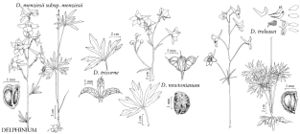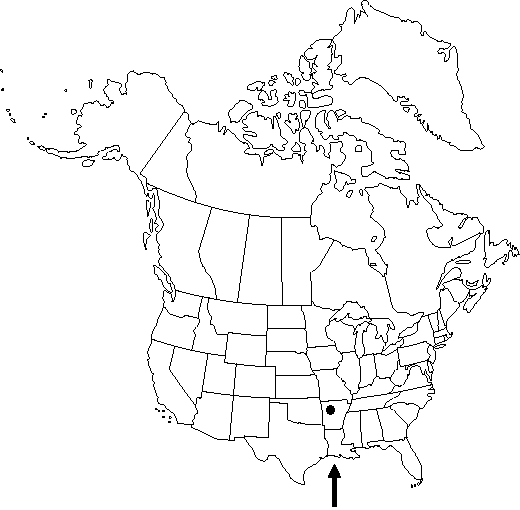Difference between revisions of "Delphinium newtonianum"
Rhodora 41: 196. 1939.
FNA>Volume Importer |
imported>Volume Importer |
||
| (6 intermediate revisions by 2 users not shown) | |||
| Line 13: | Line 13: | ||
}}{{Treatment/ID/Special_status | }}{{Treatment/ID/Special_status | ||
|code=F | |code=F | ||
| − | |label= | + | |label=Illustrated |
}} | }} | ||
|basionyms= | |basionyms= | ||
| Line 31: | Line 31: | ||
|elevation=500-700 m | |elevation=500-700 m | ||
|distribution=Ark. | |distribution=Ark. | ||
| − | |discussion=<p>No cases of hybridization are known. Delphinium newtonianum often occurs in mixed populations with D. tricorne. It normally does not begin flowering until 4-6 weeks after D. tricorne has finished.</p> | + | |discussion=<p>No cases of hybridization are known. <i>Delphinium newtonianum</i> often occurs in mixed populations with <i>D. tricorne</i>. It normally does not begin flowering until 4-6 weeks after <i>D. tricorne</i> has finished.</p> |
|tables= | |tables= | ||
|references= | |references= | ||
| Line 40: | Line 40: | ||
-->{{#Taxon: | -->{{#Taxon: | ||
name=Delphinium newtonianum | name=Delphinium newtonianum | ||
| − | |||
|authority=D. M. Moore | |authority=D. M. Moore | ||
|rank=species | |rank=species | ||
| Line 54: | Line 53: | ||
|publication title=Rhodora | |publication title=Rhodora | ||
|publication year=1939 | |publication year=1939 | ||
| − | |special status=Endemic; | + | |special status=Endemic;Illustrated |
| − | |source xml=https:// | + | |source xml=https://bitbucket.org/aafc-mbb/fna-data-curation/src/2e0870ddd59836b60bcf96646a41e87ea5a5943a/coarse_grained_fna_xml/V3/V3_807.xml |
|genus=Delphinium | |genus=Delphinium | ||
|section=Delphinium sect. Diedropetala | |section=Delphinium sect. Diedropetala | ||
Latest revision as of 22:51, 5 November 2020
Stems 40-90 cm; base often reddish, puberulent. Leaves mostly cauline; basal leaves usually absent at anthesis; cauline leaves 2-8 at anthesis; petiole 0.5-10 cm. Leaf blade round to pentagonal, 4-7 × 5-15 cm, nearly glabrous; ultimate lobes 3-7, width 8-20 mm (basal), 5-15 mm (cauline), widest at middle or in proximal 1/2. Inflorescences 8-20(-40)-flowered, as wide as long or nearly so; pedicel 1-4(-6) cm, pubescent; bracteoles 6-15 mm from flowers, green, linear, 1.5-5 mm, puberulent. Flowers: sepals dark to light blue, rarely white, glabrous, lateral sepals spreading, 12-14 × 6-7 mm, spurs straight to decurved, within 30° of horizontal, 10-15 mm; lower petal blades slightly elevated, ± exposing stamens, 4-5 mm, clefts 2-3 mm; hairs mostly centered near base of cleft, yellow. Fruits 8-12 mm, 3-3.5 times longer than wide, nearly glabrous. Seeds unwinged; surface of each seed coat cell with swollen, blunt, hairlike structures, barely visible at 20×, otherwise smooth.
Phenology: Flowering early summer.
Habitat: Slopes in deciduous forest
Elevation: 500-700 m
Discussion
No cases of hybridization are known. Delphinium newtonianum often occurs in mixed populations with D. tricorne. It normally does not begin flowering until 4-6 weeks after D. tricorne has finished.
Selected References
None.

